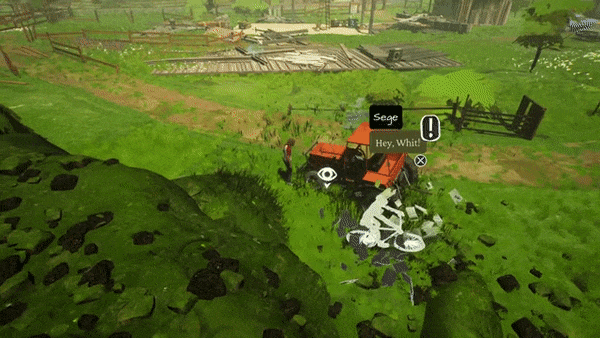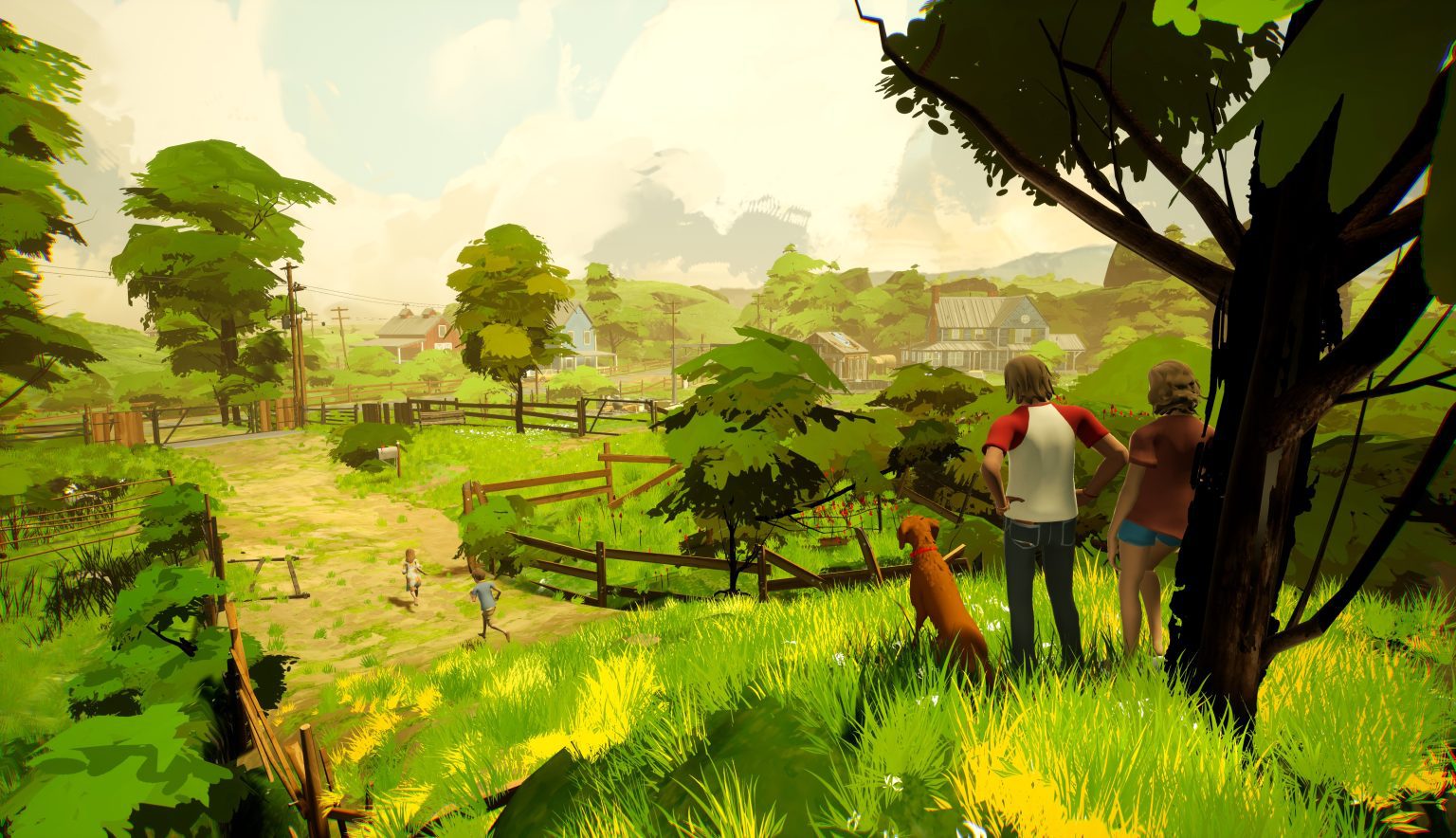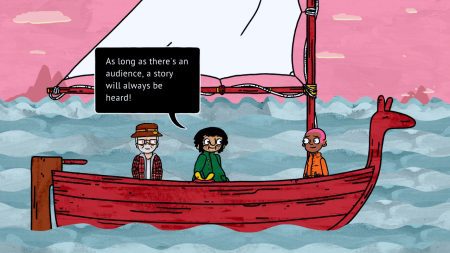Where the Heart Leads is a relationship-driven story about the impact we have on our family, friends, and community, encouraging reflection on the little moments that, over time, add up to something much more called life. It is a fully realized version of its vision, and while I think said vision is imperfect, I also believe it to be a great fit for anyone who enjoys interactive novels, worrying about choices, philosophical musings, and/or brothers who are very into experimental art.
Whit in Wonderland
Where the Heart Leads, which released on July 13 for PlayStation 4 and 5, puts you in control of protagonist Whit Anderson, the second son of a farming family in the country who is trying to figure out who he is in the world. At the start of the game, Whit is awakened by a bad storm, and goes out with his kids and wife to rescue the family dog, who has fallen into a sinkhole. To no one’s surprise, Whit falls deep into the sinkhole, gets lost, and must try to find his way out of it. As he spends time alone in the natural catacombs under the earth, he reflects on his life up to this point.
Cue interactive flashbacks. Where the Heart Leads starts slow in those first few minutes, but quickly becomes engaging once you get to relive Whit’s memories. The game’s greatest strength lies in its character writing and dialogue. I genuinely cared about Whit’s brother Sege, the troublemaking free spirit, and his childhood sweetheart Rene, who wants to prove to everyone she’s going to be somebody.
They’re not the only ones. There’s a long cast of characters who weave in and out of these memory chapters. I’ve never lived in a “traditional small town,” but this game felt true to what I imagined one being like—people knowing a little too much about everybody’s business, for better or worse. Sometimes, it was easier for Whit to make a negotiation on a construction project when he could appeal to an old relationship, and other times a situation was more difficult when folks already had preconceived notions about the Andersons.

Leading an Honest Life
From early on, Where the Heart Leads makes it clear it’s not a “scary” game. Unlike fellow adventure games Firewatch (nerve-wracking), A Night in the Woods (unsettling), What Remains of Edith Finch (disturbing), or even Life Is Strange and Life Is Strange 2 (both arguably overtly depressing), Where the Heart Leads strikes a much chiller tone. There’s even an auto-play text option to make your viewing experience more laid back. This game is best enjoyed with your coffee on an early weekend morning.
I found myself coming back to the game over the course of a week, comforted by its dreamy music, decidedly “indie” style art, and emotionally driven storytelling. The game has a sense of wistfulness to it, and I tried hard to lead Whit on a good life. “My” Whit was a family man, a creative equal but pragmatic counterpart to his spacy brother, the response of one sibling to another to maintain the family peace.
In my play-through, I opted to generally and consistently support Whit’s brother Sege, even when it meant arguing with wife Rene or disapproving parents, Aldwin and Sofia. I tried to only be a hard ass when my brother was being dangerously irresponsible. Most of our conversations were 1:1, so I didn’t expect any other characters to refer to my choices (as is the norm for games like this).
So, I was surprised when, during one chapter, a side character I chose to go speak with revealed she was Sege’s love interest and told me how much my support had meant to him over the years, that I was one of the only people who ever believed in him, who saw him for who he was and accepted him. This moment of virtual intimacy caught me off guard, and I was incredibly moved by this tiny little speech bubble.

Living With Life’s Choices
Where the Heart Leads regularly leans on this butterfly effect (even going so far as to literally call it out) of choices throughout chapters. Sometimes the choices are obvious: Support Sege’s weird art, or tell him it sucks. Other moments are more subtle, and may or may not have a devastating effect.
For example, in the first few moments of the game, I tell the kids I’ll try to save our dog, Casey, and go down in a tub attached to a winch attached to a tree AT THE EDGE OF A MASSIVE SINKHOLE. (Super safe.) When I get to Casey, she’s too scared to jump in the tub with me. The game tells me I can “Calm Casey down” or “Find another way.” I’m a young dad; I can’t risk dying, so I go back up to seek an alternative. But of course, I’ve seen the game’s trailers, and I should’ve known: There’s no way that tub ain’t falling to the bowels of the earth.
Not only does Whit fall down, but he finds Casey’s collar, with the implication that he just killed his dog. Immediately, I got a PS notification letting me know I’d found a Very Rare trophy because, apparently, no one else did what I did, and I’m a monster. As I guided Whit through overgrown tunnels, I thought to myself, Could Casey have been with me this whole time?
The tub-Casey conundrum was not the only one, and in a rare move for me, I didn’t save and rewind. Instead, I let myself live with the consequences of my actions. There were moments where I wondered what would’ve happened if I could’ve found this extra piece of ladder, if I had stolen the champagne my dad had been saving for a picnic with Rene, or if I had trusted my gut on an artistic project with Sege. The stakes get higher as the characters get older, and I’m not sure I made the right calls, even though I tried my best. (Which might verbatim be something Whit says about being a dad. Where do I end and Whit begins?)
I was pleased to know I couldn’t consistently predict the effects of my choices. I thought spending a day building with my dad would help him realize how important family was; instead, for the years after, he focused on the monetary success as a result of those buildings, blowing his grandkids off. I’m curious about other paths, but to be honest, I’m not sure I’m curious enough to play the whole game over again. It’s long for essentially an interactive novel, clocking in at around 15-20 hours, and there’s quite a bit of running around large maps and finding the right people to talk to and when.

An Arduous (But Worthwhile) Journey
Herein lies the fault: For me, Where the Heart Leads overstayed its welcome by about 25%. Early on, I had a feeling of where the game was going, and then it went there, and I was cool with it, appreciated it, kept playing it. And then it just kept going. And going. At one point, Whit even says to another character, “I feel like we’ve been doing this for a long time.” And I was like, couldn’t have said it better myself, bro.
Perhaps part of its longer length is to justify its $24.99 price tag, which I felt is quite a bit for a game like this. Or, developer Armature Games is just so committed to the overall meta game vision (which I’d like to discuss with anyone else who plays it, so hmu) that it went all the way, even if the game might have been better off being a bit shorter.
Despite its length, or perhaps because of it, it was clear to me how much love has been poured into this game. There are poignant conversations. There are super satisfying (albeit highly unrealistic) animations of building sculptures and structures throughout the game, and glittery, reflective imagery of mirror-like outlines of characters. There is a core emotional drive throughout the story: At first, Whit’s world revolves around his love, Rene, and his brother, Sege. Over time, Whit’s heart must expand and evolve: He goes from being a naïve teenager to a thoughtful young man to a try-hard father to a dependable staple of the city. Whit checks in on his kids, his aging mother, his old buddies and rivals.
Right now, Where the Heart Leads is only available on PS5 and PS4, but I could see it being a fantastic Switch or iOS port, and perhaps an even more natural fit for Xbox Game Pass. It would fit in with the service’s lineup of story-driven, nonviolent games like The Gardens Between, What Remains of Edith Finch, and Eastshade.

Final Thoughts
Where the Heart Leads fills a void after the closure of Telltale, which famously popularized interactive, combat-less games that ask for decisions to be made and for conversations to be had. I could practically see an icon twirling in the upper right hand corner, saying, Sege will remember you said that.
I hope Where the Heart Leads is a sign of more games in that space. If you’re looking for a game that is quiet without being boring, philosophical but not peaceful, and sweet without being trite, then Where the Heart Leads should be in consideration for your next indie binge.
Score: 7.8/10
*Review code provided by the publisher
Amanda Tien (she/her or they) loves video games where she can pet dogs, solve mysteries, punch bad guys, play as a cool lady, and/or have a good cry. She started writing with The Punished Backlog in 2020 and became an Editor in 2022. Amanda also does a lot of the site's graphic designs and podcast editing. Amanda's work has been published in Unwinnable Monthly, Poets.org, Salt Hill Journal, Aster(ix) Journal, and more. She holds an MFA in Fiction from the University of Pittsburgh. Learn more about her writing, visual art, graphic design, and marketing work at www.amandatien.com.











Thank you for the thoughtful review.